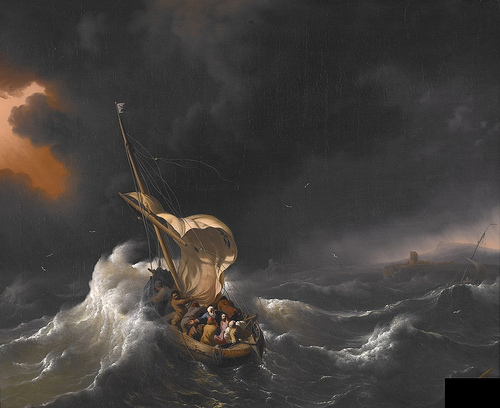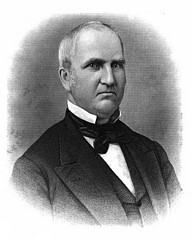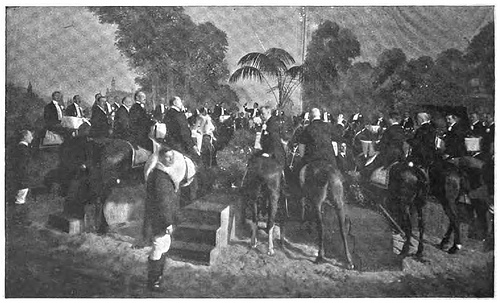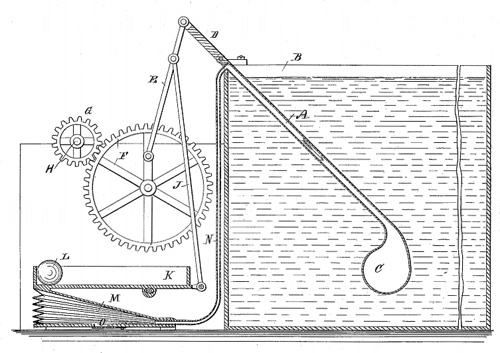
procellous
adj. stormy
naufragous
adj. causing shipwreck

procellous
adj. stormy
naufragous
adj. causing shipwreck
On Aug. 10, 2004, Cincinnati Reds first baseman Adam Dunn hit a ball entirely out of Cincinnati’s Great American Ball Park. It landed on Mehring Way, 535 feet from home plate, hopped another 200 feet or so, and came to rest on a piece of driftwood on the edge of the Ohio River.
That part of the river belongs to Kentucky. This makes Dunn the only player in major league history to hit the ball into another state.
See Pop Fly and Four-Dimensional Basketball.

Let us take a piece of string. In the first half minute we shall form an equilateral triangle with the string; in the next quarter minute we shall employ the string to form a square; in the next eighth minute we shall form a regular pentagon; etc. ad infinitum. At the end of the minute what figure or shape will our piece of string be found to have assumed? Surely it can only be a circle. And yet how intelligible is that process? Each and every one of the polygons in our infinite series contains only a finite number of sides. There is thus a serious conceptual gap separating the circle, as in the limiting case, from each and every polygon in the infinite series.
— Jose Amado Benardete, Infinity: An Essay in Metaphysics, 1964
Turn each of these palindromes “inside out” and their sum remains the same:
13031 + 42024 + 53035 + 57075 + 68086 + 97079 = 31013 + 24042 + 35053 + 75057 + 86068 + 79097
Remarkably, this holds true even if you square or cube them:
130312 + 420242 + 530352 + 570752 + 680862 + 970792 = 310132 + 240422 + 350532 + 750572 + 860682 + 790972
130313 + 420243 + 530353 + 570753 + 680863 + 970793 = 310133 + 240423 + 350533 + 750573 + 860683 + 790973
From Albert Beiler, Recreations in the Theory of Numbers, 1964.
How many pets do I have if all of them are dogs except two, all are cats except two, and all are fish except two?

Cushing Biggs Hassell’s thousand-page History of the Church of God (1886) is notable for a single sentence — this one, on page 580, beginning “The nineteenth is the century …”
It’s six pages long, with 3,153 words, 360 commas, 86 semicolons, and six footnotes. Many regard it as the longest legitimate sentence ever published in a book.
Essentially it’s one long indictment of the 19th century, proving for Hassell that “after all our progress, this is still a very sinful and miserable world.” Why he felt he had to show this in a single sentence is not clear.

On March 28, 1903, industrialist and horse lover C.K.G. Billings hosted a one-of-a-kind dinner at Sherry’s Restaurant in New York. He covered the floor of the restaurant’s grand ballroom with turf and brought in 36 horses via the freight elevator. The diners passed the evening on horseback, eating from tables on their pommels and drinking champagne from chilled bottles in the saddlebags.
The bill for this came to $50,000, but that was nothing to Billings, who had just retired as president of the People’s Gas Light and Coke Company in Chicago and was celebrating the opening of a new stable in Manhattan. The horses got oats.
See Feeder of the Pack and Black Tie Optional.
“We may see the small value God has for riches by the people he gives them to.” — Alexander Pope
In 1929, aspiring actor Charles Loeb had a friend pack him into a box labeled “Statue–Handle With Care” and ship him from Chicago to the Pathé motion picture studios in Culver City, Calif.
He arrived four days later, nearly dead, but told police he was pleased he’d finally made it through the gates of a major studio.
See Special Delivery.

Patent examiners are busy people, and when this application arrived at the U.S. Patent Office in 1881 it seemed innocuous enough — the inventor, John Sutliff, had called it simply “motor.” So they issued the patent.
It is, in fact, a perpetual motion machine. When ball L rolls to the left, it depresses the bellows, which fills the submerged bulb, raising the lever and turning cogwheel F. This pivots the box, which sends the ball back to the right, drawing air into the bellows and submerging the bulb again, “and so on alternately.”
Thus the cogwheel turns forever, driving shaft H, which you can hook up to anything you like. A convenient source of endless free energy, and it’s been under our noses all this time.